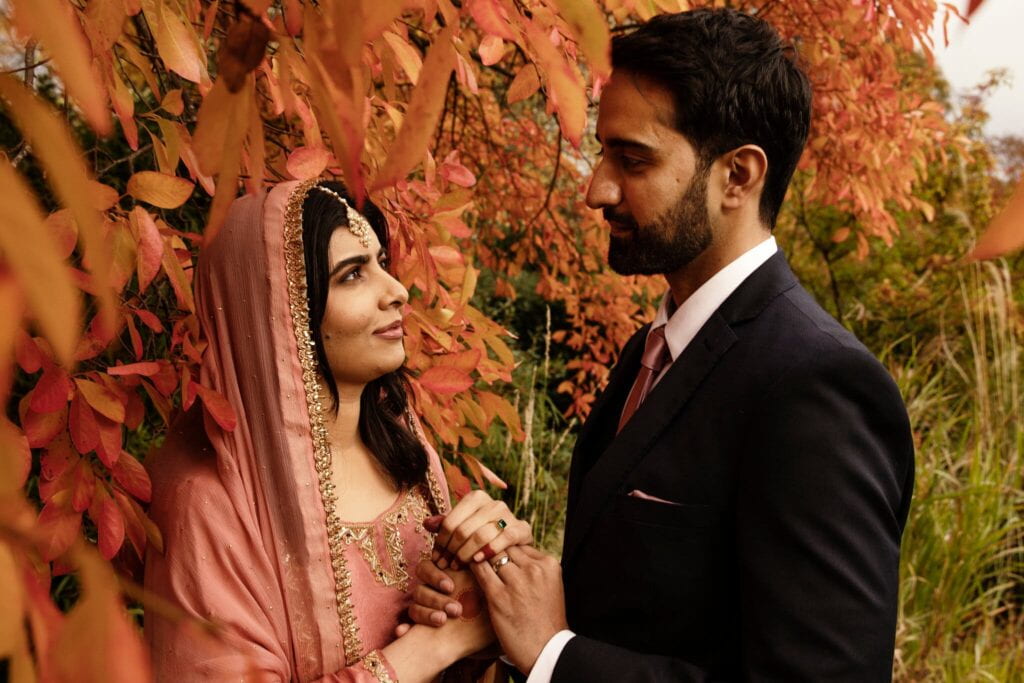By Amna Azam *

We have been unfair putting her on a perpetual pedestal of defiant, world-shaking feminist activism. In doing so, we have disregarded her personhood and institutionalized her existence.
Photo by Malin Fezehai / @Malala on Twitter.
Following the announcement of Malala Yousafzai’s wedding ceremony in November, people across the world took to Twitter to voice their support for her. Characteristic of anytime she is in the news, however, anti-feminists were also quick to criticize her. And, this time, among her critics were some of her most ardent feminist supporters. Their criticism stemmed from a range of issues, from genuine concern for her well-being to disappointment in her conformity to gendered expectations. Instead of celebrating this occasion in her life, many rallied against her decision, but it is incredibly unfair to impose the entirety of our expectations of the perfect feminist onto Malala. She is an individual first and foremost, and a representation of the hope of feminist activists second.
At only 24 years of age, Malala has become a household name across the globe as a symbol of feminist activism. There are many young girls like her who put their lives at risk to seek education in countries like Pakistan and Afghanistan everyday. What makes her stand out, then? It is not simply who she is, it is what Malala represents —undeterred tenacity in the face of a literal and ideological adversary, i.e the Patriarchy. This stems from what she was able to overcome after the Taliban attacks, and the fact that she did not let them intimidate her into submission and silence. She went on to get a decent education (to put it lightly), and started a non-profit dedicated to educating young girls across the world. But one could be Malala and still have to conform to the gendered expectations of a good Pakistani woman. Earlier last year, Malala had criticized the institution of marriage; today, she is married.
For those of us who look to her as a shining beacon of hope in the patriarchal hellscape that is our world, she is a manifestation of overcoming our collective struggle as women and girls. In doing so, we have institutionalized Malala herself, as ‘the one’ among us who stands tall against oppression, discrimination and societal expectations. She is no longer just Malala, but a woman who, as a complex human being, has wants and desires of her own. A woman with a family that has certain expectations of her. A woman who has to bargain and pick her battles, just like the rest of us. She has been made The Malala Yousafzai, survivor of the Taliban, and the eternal defier of patriarchy. Do we think that she exists in isolation in some utopian vacuum of feminist paradise? Her heroic triumph over the Taliban attack does not mark the ultimate defeat of patriarchal norms. Not her life, and not our own by extension.
There is no way for us to know the conditions (good, bad or both) that led up to her marriage. But that is not the point. The feminist discourse that dominated the conversation around her marriage points to an issue in the global feminist community: Are we reproducing an inverse of the Virtuous/Whore sexist dichotomy in mainstream feminism? That is, the notion of a bad feminist vs. a good feminist. This is a slippery slope: who speaks for “all feminists, everywhere”? A robust feminist discourse and activist landscape is one that encompasses a diversity of thoughts and opinions. Different battles exist in their own unique contexts and therefore demand unique responses as well. The same level of intensity and need for feminist activism on different issues can not be replicated in every single context. Womanhood and the grievances associated with it are multifaceted and layered, just as we are. We are all simply Feminists trying to liberate ourselves and each other. We do not have to agree on everything, and that is okay.
We have made Malala larger than life; this is ironic because part of the reason as to why she rose to fame was a sense of kinship born out of the relatability we felt with her. We all saw a part of ourselves in her. And when she was able to overcome her one big struggle, we started to revere her in a sacred sort of way. We have been unfair putting her on a perpetual pedestal of defiant, world-shaking feminist activism. In doing so, we have disregarded her personhood and institutionalized her existence. Feminist ideology guides us to do better than that. Because the ultimate fight is to have our humanity recognized —something that is denied to us every day, in every possible way. We, feminists, owe it to each other to never forget the unique quirks that make us individual people with flaws, ambitions, desires and longings.
*Amna Azam is a senior student at NYU CGA.
Leave a Reply
You must be logged in to post a comment.